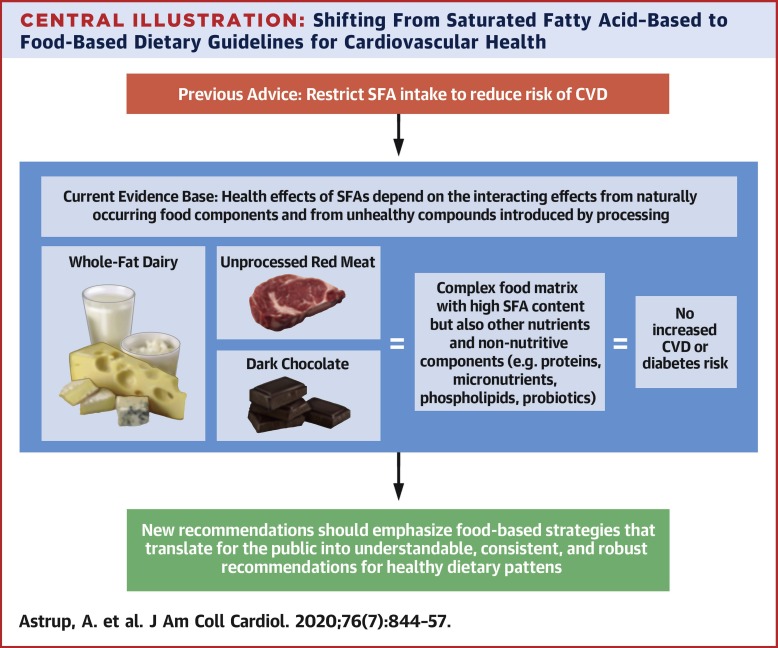Saturated Fats and Health: A Reassessment and Proposal for Food-Based Recommendations: JACC State-of-the-Art Review
re: nutrition
re: Nina Teicholz
Real science is never settled, and anyone who has certainty on such things is not qualified to discuss it.
The “saturated fat is bad for you” myth is largely intact, but the foundational cracks are spreading.
Saturated Fats and Health: A Reassessment and Proposal for Food-Based Recommendations: JACC State-of-the-Art Review
2020. Emphasis added.
Highlights
- The U.S. Dietary Guidelines recommend the restriction of SFA intake to <10% of calories to reduce CVD.
- Different SFAs have different biologic effects, which are further modified by the food matrix and the carbohydrate content of the diet.
- Several foods relatively rich in SFAs, such as whole-fat dairy, dark chocolate, and unprocessed meat, are not associated with increased CVD or diabetes risk.
- There is no robust evidence that current population-wide arbitrary upper limits on saturated fat consumption in the United States will prevent CVD or reduce mortality.
Abstract
The recommendation to limit dietary saturated fatty acid (SFA) intake has persisted despite mounting evidence to the contrary. Most recent meta-analyses of randomized trials and observational studies found no beneficial effects of reducing SFA intake on cardiovascular disease (CVD) and total mortality, and instead found protective effects against stroke.
Although SFAs increase low-density lipoprotein (LDL) cholesterol, in most individuals, this is not due to increasing levels of small, dense LDL particles, but rather larger LDL particles, which are much less strongly related to CVD risk. It is also apparent that the health effects of foods cannot be predicted by their content in any nutrient group without considering the overall macronutrient distribution.
Whole-fat dairy, unprocessed meat, and dark chocolate are SFA-rich foods with a complex matrix that are not associated with increased risk of CVD. The totality of available evidence does not support further limiting the intake of such foods.
Lowering the consumption of saturated fat has been a central theme of U.S. dietary goals and recommendations since the late 1970s (1). Since 1980, it has been recommended that saturated fatty acid (SFA) intake be limited to <10% of total calories as a means of reducing risk for cardiovascular disease (CVD) (1).
...
Conclusions
The long-standing bias against foods rich in saturated fats should be replaced with a view toward recommending diets consisting of healthy foods.
What steps could shift the bias? We suggest the following measures:
1) enhance the public’s understanding that many foods (e.g., whole-fat dairy) that play an important role in meeting dietary and nutritional recommendations may also be rich in saturated fats;
2) make the public aware that low-carbohydrate diets high in saturated fat, which are popular for managing body weight, may also improve metabolic disease endpoints in some individuals, but emphasize that health effects of dietary carbohydrate—just like those of saturated fat—depend on the amount, type and quality of carbohydrate, food sources, degree of processing, etc.;
3) shift focus from the current paradigm that emphasizes the saturated fat content of foods as key for health to one that centers on specific traditional foods, so that nutritionists, dietitians, and the public can easily identify healthful sources of saturated fats; and
4) encourage committees in charge of making macronutrient-based recommendations to translate those recommendations into appropriate, culturally sensitive dietary patterns tailored to different populations.
WIND: eat whole unprocessed foods, minimized added sugar and excess carbohydrates, live long and prosper.
* Peer review is a farce for numerous reasons, but starting with (almost always) no access to the data even by the authors of the study, let alone the reviewers, let alone the medical community at large, let alone studies never published because of rebutting the hypothesis, let alone studies crafted to find the "right" answer.




